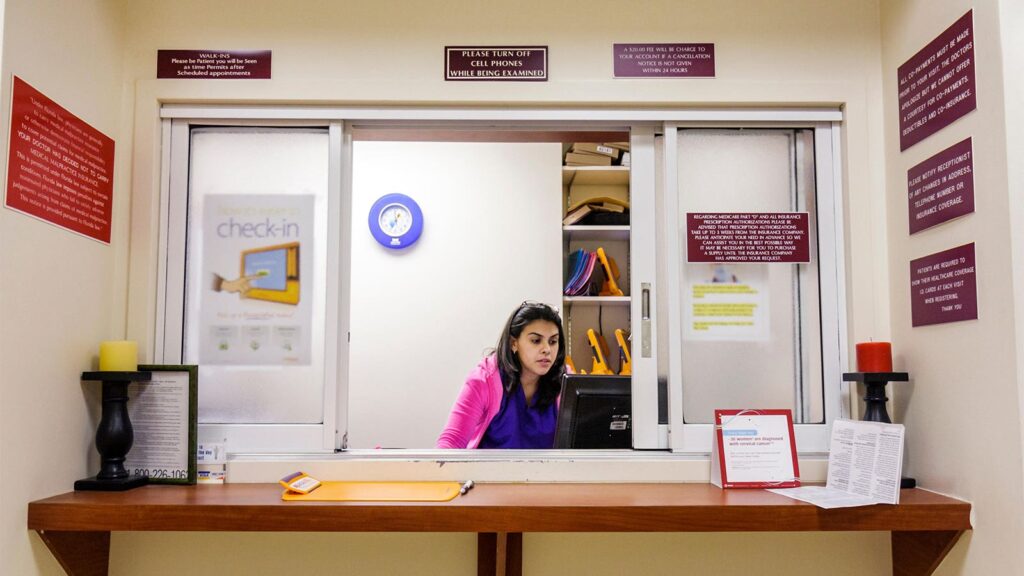Khan is a neurologist.
Imagine leaving your home on a bitter-cold morning, -10°F, scraping ice off your car, and trudging through the freezing air to a far-off parking spot. You arrive at the medical office, you’re the first to unlock the door, preparing for the day ahead before anyone else shows up. By 7 a.m., the phones are already ringing.
Medical front desk staff or medical receptionists play a critical role in keeping healthcare offices running. Their responsibilities include managing day-to-day functions like scheduling appointments, answering patient calls, coordinating follow-ups, and troubleshooting issues on the fly. They wear many hats, balancing compassion with efficiency in a system that often offers them little support. Yet, despite their essential contributions, their work is frequently taken for granted.
Unlike some others in the healthcare ecosystem who may benefit from performance-based bonuses, profit-sharing incentives, or perks tied to organizational success, front desk staff typically work on fixed pay. Despite being central to managing patient flow and ensuring operational efficiency, they generally receive no additional rewards for their efforts. In smaller clinics, particularly those in rural areas, limited resources often increase their workload and responsibilities. Additionally, they lack the support of unions or professional organizations, leaving them without a voice in the system.
A Misplaced Target for Frustrations
As the first and last point of contact, front desk staff shape the patient experience. Their role is essential, but they face unique challenges, managing frustrations that stem from broader systemic issues.
Patients and their families often feel frustrated by delayed appointments, scheduling conflicts, or inefficiencies in the healthcare system. These frustrations are valid and deserve attention, but they can sometimes be directed toward front desk staff who are simply trying to do their jobs within the constraints of the system. In some cases, this frustration escalates into verbal aggression, including shouting, insults, and accusations.
A systematic review published in Family Medicine and Community Health found that verbal abuse, racial insults, and even physical threats toward front desk staff are routine occurrences in healthcare settings. The study, which analyzed 20 research papers from five different countries, highlights that front desk staff frequently bear the brunt of patient frustrations related to scheduling, delays, and denied prescriptions — despite not being responsible for these policies.
Many healthcare offices display signage indicating zero-tolerance policies against aggression, but front desk staff often feel these policies are not consistently reinforced. Without clear action and support, staff members may struggle to feel safe and valued in their roles.
For many front desk employees, particularly those juggling responsibilities both inside and outside of work, the cumulative effect of these challenges can lead to stress and burnout. Without structured mechanisms for support, these essential healthcare workers may feel unheard and undervalued.
Creating a Supportive Environment
Healthcare organizations and professionals have an opportunity to create a more positive and supportive environment for front desk staff. While kindness and patience from patients are always appreciated, meaningful improvements come from systemic changes that acknowledge the challenges these employees face.
A key starting point is reinforcing clear and consistent workplace policies that prioritize respectful communication. When front desk employees know they can report concerns and leadership will listen, it fosters a greater sense of security. Offices that create structured approaches — such as providing staff with de-escalation training or designating a point person to assist in difficult interactions — can help mitigate the stress of handling challenging situations alone.
Additionally, improving scheduling and staffing strategies can ease the burden on front desk staff and reduce the frustrations that contribute to difficult patient interactions. Many healthcare facilities are already working toward more efficient scheduling systems, but continued investment in these improvements can benefit both patients and staff by minimizing common points of friction.
Equally important is ensuring that front desk employees feel valued within the healthcare team. Simple but meaningful gestures — such as recognition for their hard work, opportunities for professional growth, and open lines of communication with leadership — can have a significant impact on morale. When front desk staff feel supported, they are better equipped to create a welcoming and efficient environment for patients.
A Collective Effort Toward Positive Change
Front desk staff play an essential role in healthcare, balancing administrative responsibilities with the human side of patient care. Their work is fast-paced, emotionally demanding, and often underappreciated. While policies and training can help improve their work environment, creating a culture of support requires a collective effort — from leadership, healthcare providers, and colleagues alike.
By recognizing the challenges they face, offering meaningful support, and ensuring that workplace policies translate into real-world protections, we can create an environment where front desk staff feel valued and empowered. When they are supported, the entire healthcare system benefits — leading to a better experience for staff, patients, and providers alike.
Adnan Imdad Khan, MD, is a neurologist in New Hampshire.
Please enable JavaScript to view the

